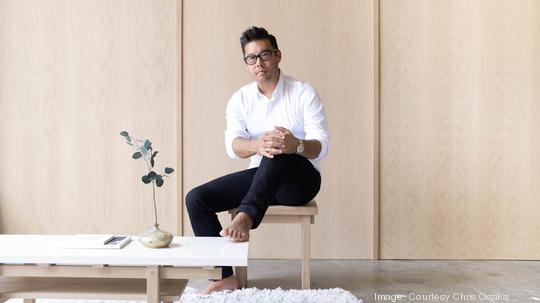
When Chris Osaka founded the prefabricated home manufacturer Tomu LLC in 2020, he envisioned his clients being individuals looking for second homes or income-producing rental properties.
Now, two years into the venture, his D.C.-based company — a Washington Business Journal startup to watch for 2022 — is looking to raise $2 million in fresh capital to ramp up production and sell its modular homes to a broader range of clients. Among them: developers of recreational vehicle and retirement communities, universities seeking to provide housing for faculty and even hotels looking to beat the likes of Airbnb at their own game.
It made the pivot over the summer, after Tomu displayed a prototype of its luxury modular home — with touches like soaking tubs and rain showers — at the Department of Housing and Urban Development's annual innovative housing showcase on the National Mall. A representative for a real estate investment trust that develops RV and retirement communities was intrigued by the concept and saw an opportunity to develop communities for short-term rentals, which are attractive to property owner because they have greater profit margins than long-term rental properties.
That conversation convinced Osaka, who has held corporate leadership positions in marketing at Nike Inc. and Hilton Worldwide Holdings Inc., to rethink who Tomu's main clients might be.
“We don’t want to forget about the individual. We still want to create a product that they can buy, but we can't ignore the broader opportunity," he said. “It’s a fundamentally different business model to address people of that scale rather than from a very customer relations heavy, project management heavy, private residential side,”
Tomu sits somewhere between an architecture firm and a construction company. Each prefabricated home is built at its manufacturing facility in Frederick Maryland, then shipped to clients for assembly. The homes are designed to feel like a luxury hotel room rather than a tiny house, with big windows and 9-foot ceilings. A studio villa (480 square feet) starts at $99,500, a one-bedroom (960 square feet) starts at $179,500 and a two-bedroom (1,440 square feet) starts at $259,500. The company recently said that the pricing will increase to $145,000 for a studio, $235,000 for a one-bedroom and $325,000 for a two-bedroom starting Nov. 16.
The clients Tomu is now targeting already have land and are trying to figure out what to build on it. For example, Osaka said he has found interest from commercial clients looking to build getaway cottages near the wineries and craft breweries in the Virginia mountains.
For the individual buyers, Osaka said he's received inquiries and reservations from people in states throughout the country.
"You’d be surprised how many people just have land lying around in their family [that] they’re trying to figure out something to do with," he said.
Osaka was motivated to start Tomu in 2020, when the pandemic spurred a surge in demand for short-term rentals and the supply dwindled as cash-rich investors quickly snapped up properties.
“We were seeing the spillover because there wasn’t enough rental inventory in the market,” said Osaka, “These companies that had cash on hand were going up and buying homes to turn into Airbnbs or short-term rentals and that in turn was impacting the housing market that was already in short supply.”
The company was initially self-funded with about $300,000 but is now looking to raise additional capital to turn orders of six or 12 homes into orders of 50 or 200 homes.
Chief Financial Officer Cheryl Heller said the fundraising effort has just begun and that she hopes to close the offering by the.end next year's first quarter. The funds will be used to expand Tomu's manufacturing capabilities and build out its team of six by adding staffers in sales, business development, logistics, and client services.
Osaka said he based Tomu in the D.C. region because it is home to some giants in the hospitality industry — including Hilton (NYSE: HLT), Marriott International Inc. (NYSE: MAR) and Choice Hotels International (NYSE: CHH) — that, he hopes, could someday be Tomu clients as they look to diversify their offerings to travelers.
“It's being close enough to the leaderships or the decision makers in those companies where we can understand what they are needing and what they're looking for as they innovate for their consumers,” Osaka said.
It's important, too, to be close to the people setting housing policy, "whether it be HUD or members of Congress, where we can help inform the conversation around housing," Osaka added.